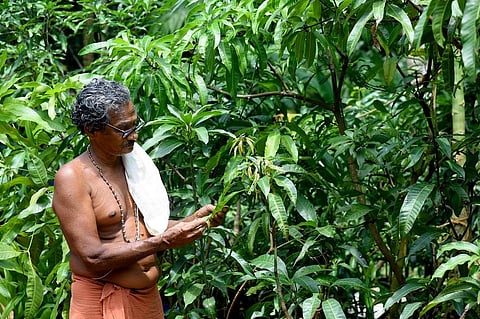

PALAKKAD: 'Moorthiyedath Mana,' is a haven for King of Fruits.
Located at Valambilimangalam near Sreekrishnapuram in Ottappalam taluk of Palakkad district, it is the home for mangoes grown by the simple but dedicated natural farmer, M Shankaran Namboodiri who leads a life which is in harmony with nature. So, naturally chemical fertilisers and pesticides have no place there.
"Chemicals have no place in my three-and-a-half acre compound," he says firmly as he shows the 300-odd varieties of mango saplings he has conserved, many of which were on the verge of extinction.
The mangoes conserved by this farmer include imported varieties available in the US, Pakistan, Australia, China, Japan, Thailand and Malaysia. There are also mango varieties from North Indian states and many native Kerala varieties. He has tagged the names of each variety on the saplings kept in specially-made, environment-friendly bags.
"I have been developing the garden at my home since 1976," he says.
He recalls the visit of agriculture scientist Subash Palekar to Palakkad. He says, "I attended a few classes. I always equate myself with the zero-budget, natural farming practised by Subash Palekar, though there may be little variations based on the region and climate," he said.
There are around 16 native mango varieties that have received the GI tag in India, and another six varieties already registered are awaiting certification.
"I have at least 10 of them in my garden. There were more than 30 varieties from Kerala, including Kottoorkonam, Kuttiyattoor (the only GI-certified one from Kerala), Kattaparamban, Ollor of Aroor, Kozhikode and Kairali. There were also exotic 'pasand' mango varieties like Rani pasand, the renowned and expensive 'Kohitoor', and UP chousa," said Namboodiri proudly.
"I have personally found that cardamom is one crop where pesticides are used the most. But people purchase it from the shops to add flavour to their dishes. I have cultivated some cardamom plants in this compound and use them for domestic consumption," he said.
The 66-year-old farmer said that when former chief secretary P K Mohanty visited his house in 2007 (while he was the land use board commissioner) and saw the farm, he queried as to whether Shankaran had secured a degree in agriculture science. "I replied that I had studied only up to the tenth standard. It was the experience gained through practice and toiling on the ground over the past few decades which made me adopt scientific farming methods. Mohanty advised me to create awareness among the public on the need to conserve our rich traditional varieties of plants," he said.
Shankaran also has a cow shed where native breeds like Ananganmala kullan and Vilwadhiri, both found in Palakkad district, Krishna Valley from Karnataka, and Kapila, found on the Kerala-Karnataka border, are reared. The dung was used for generating biogas, and the slurry mixed with water pumped from a large pond was used to irrigate the plants.
The crops grown include coffee, cardamom, coconut, areca nut, different varieties of lime, Indian jujube (Elanthapazham), mango, Rambuttan, bear apple, mangosteen, dragon fruit, guava and even grapes.
Meanwhile, the house in which he is staying, Maruthery mana, is built in a traditional manner and even after two years it is yet to be completed. The walls are made of mud and laterite bricks and they have been left unplastered. The pillars of the house are also similar and there is a 'nadumuttam'.
The compound walls are also made of laterite (mud) bricks.
The moderate-sized house has three storeys as in the case of a 'nallukettu' and has a tiled roof to keep the inmates cool during summer.